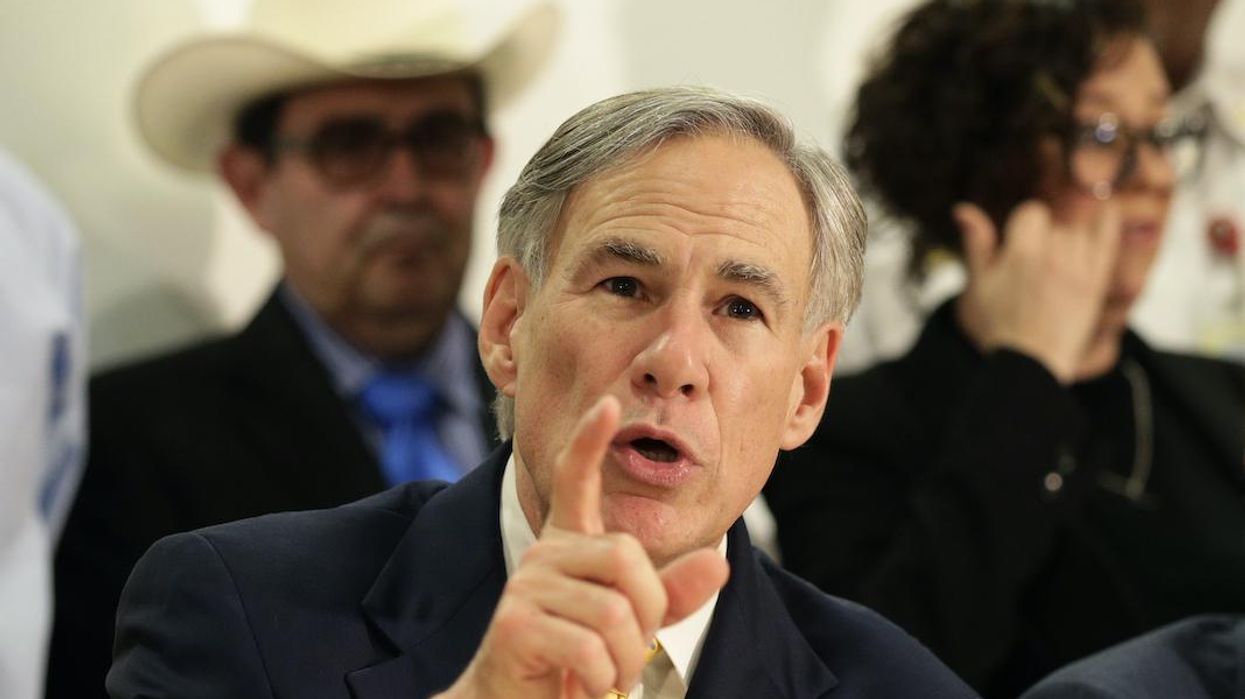Why Abbott’s Ban On Vaccine Mandates Is Likely Doomed In Court

On Monday afternoon, Texas Republican Gov. Greg Abbott set his state on a collision course with President Joe Biden's COVID-19 vaccine requirements, issuing an executive order banning any business that operates in the state from requiring employees to get the shots.
Claiming that the Biden administration is "bullying" private entities into imposing vaccine mandates, Abbott wrote that he "hereby suspend[s] all relevant statutes to the extent necessary to enforce this prohibition."
Legal and political experts say Abbott's move is all but certain to fail and suggest it was more likely designed to serve his political ambitions than the needs of Texas business owners.
"It's a piece of political grandstanding by a governor desperate to avoid being primaried in the Republican race for the governorship," Sanford Levinson, a professor of law and government at the University of Texas, told the American Independent Foundation.
Abbott, who is up for reelection next year, has throughout the pandemic enacted policies that privileged business interests and appeals to individual liberty over the recommendations of public health officials. Over the summer, Abbott issued orders banning local government entities from requiring masks or vaccinations and also tried to prevent school districts from requiring masks in the classroom.
After a decision by the Texas Supreme Court in August effectively allowed schools to continue requiring masks, however, the Texas Education Agency announced in September that it would no longer enforce the school masking ban. Several legal challenges to that policy are still pending at the state and federal levels, including one on behalf of 14 students with disabilities, who argue the ban violates their civil rights.
The legal matters at hand in Abbott's latest order are fairly cut and dried, experts have argued. Biden's vaccine mandate policy calls on all business with 100 employees or more to require their workforce to be fully vaccinated or undergo weekly COVID testing. The Biden administration will rely on the Labor Department's Occupational Safety and Health Administration to implement the mandate, tasking the agency with enforcing an "emergency temporary standard" that grants officials the power to protect employees who face a "grave danger."
Though Abbott may try to "supersede" Biden's mandates with his executive order, the so-called "supremacy clause" of the U.S. Constitution privileges federal policy over state action when the two are in direct contradiction.
"Generally, when there's a conflict, the federal law will trump the state law," Josh Blackman, a constitutional law professor at the South Texas College of Law Houston, told a local Austin news outlet. "I think Gov. Abbott knows that and is using this to set up litigation against the federal government in the next few months."
Even if Abbott succeeds in setting up a legal challenge to Biden's mandates, he faces a tough climb trying to move the courts in his favor.
"[Abbott's] only plausible legal argument is that somehow or other OSHA is overstepping the bounds of its delegated powers under Congress to protect the health, safety, and welfare of American workers," Levinson said. "I think that's a hard argument to make when 700,000 people have already died because of the pandemic."
Asked about the governor's most recent move in a Tuesday briefing at the White House, press secretary Jen Psakiaccused Abbott of "putting politics ahead of health."
"We're going to continue to implement the law, which the president of the United States has the ability, the authority, the legal authority to do," Psaki said.
Meanwhile, several prominent Texas businesses have said they intend to ignore Abbott's order and comply with the federal guidelines. Both American Airlines and Southwest Airlines told Bloomberg they'd maintain a vaccine requirement for their employees, a message echoed by the president of the Greater Houston Partnership, whose members include Accenture, JPMorgan Chase & Co., ExxonMobil, and more.
"The governor's executive order does not support Texas businesses' ability and duty to create a safe workplace," president and CEO of the partnership Bob Harvey said in a statement. "While the courts will likely decide the validity of this order, we encourage all employers to continue to promote the importance of vaccinations with their employees."
Given the near certainty of legal failure, some see Abbott's order as little more than a political messaging tactic.
In recent months, Abbott's approval rating has been steadily declining and is now at one of its lowest points ever. The governor is also facing two GOP primary challengers who have repeatedly criticized him for the few COVID protections he did implement early in the pandemic, describing them as affronts to Texans' liberty.
After Abbott's announcement of the mandate ban, one of those challengers, former state Sen. Donald Huffines, labeled him a "political windsock," adding, "He knows conservative Republican voters are tired of the vaccine mandates and tired of him being a failed leader."
There's also the question of Abbott's political ambitions beyond the governorship. "I suspect that when he looks in the mirror, he might see a future president," Levinson said.
When asked last year whether he was considering a run for president in 2024, Abbott noted his focus was primarily on his reelection but added, "We'll see what happens."
"Who knows?" Levinson said of Abbott's political future. "But I think that to view this as simply an interesting debate among lawyers is missing the point."
Published with permission of The American Independent Foundation.








